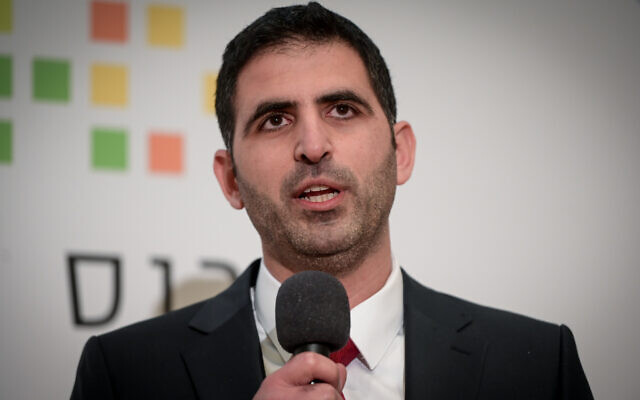A freshman lawmaker for Prime Minister Benjamin Netanyahu’s Likud party launched a bid Sunday to bar journalists from airing recordings of people without receiving their express consent beforehand, drawing widespread condemnation from media professionals, who fear their work will be inhibited.
The criticism, voiced from left and right, was intensified by the fact that the bill’s proponent, MK Boaz Bismuth, is a veteran journalist who served until a year ago as the editor-in-chief of the Israel Hayom daily.
Bismuth’s first law bill as a lawmaker, formally filed two weeks ago and made public on Sunday, is an amendment to Israel’s privacy law updating the list of actions defined as violations of privacy. His proposal would add to the list publishing a recording of a person without their consent that includes “sensitive information” about the individual.
“Sensitive information” is defined by law as information about a person’s personality, health condition, financial condition, opinions and beliefs.
Bismuth’s bill would make publishing such recordings — which commonly form the basis of journalistic exposés on criminals and politicians — an offense carrying a punishment of up to five years behind bars.
Posting his proposal on Twitter, Bismuth wrote: “In the technological era we live in, any person can record a conversation with sensitive content and publish it. The law amendment will ensure that publishing such a recording counts as a severe violation of privacy.”
In the written explanation accompanying his bill, Bismuth said the current law is problematic because “the technological ability to record conversations should be primarily used to preserve information for private purposes, not to publish them in a manner that could violate an individual’s privacy.”
Journalists and pundits from across the political spectrum, including staunch supporters of Netanyahu’s ruling right-religious bloc, condemned the proposal.
“Mr. Bismuth has to give an explanation to the poor elderly woman whose air conditioner technician came to her home and swindled her out of a high sum just because she doesn’t understand, [which] was exposed only because we are still permitted to do our job,” tweeted Channel 13 reporter Yossi Eli. “Mr. Bismuth should look in the eyes of parents who come to confront the kindergarten teacher of their children who is suspected of abusing toddlers. A shameful bill.”
Then Prime Minister Benjamin Netanyahu (R) and Israel Hayom editor Boaz Bismuth speak at the Israel Hayom forum in Jerusalem on June 27, 2019. (Gideon Markovitz)
Haim Etgar, who has a television show dedicated to recording and filming business conmen in action, said the bill would have prevented the uncovering of many criminals who have been convicted because of actions exposed in his program.
Avraham Bloch, a reporter for the right-leaning Srugim news site, called the bill “anti-democratic” and “a real shame,” adding: “How will you hear about politicians’ lies, fraudsters’ misdeeds, uncovering pedophiles or heartless people who steal from the elderly?”
The Union of Journalists in Israel said it “rejects” the bill, “which limits journalistic freedom and harms the general public.”
In a statement, the union wrote: “Part of our job is to publish recordings that often reveal what certain parties would rather stay hidden — from shady, corrupt deals to crimes committed against the weak: kids, the elderly and other marginalized groups.
“Handing the recorded person the right to approve or reject a recording is a prize for corrupt people and conmen. It is shocking and unbelievable that this is the first law bill filed by someone who for many years was a senior journalist and the editor-in-chief of a high-circulation newspaper.”
Bismuth was a journalist since the 1980s, first for the Maariv daily and then for Yedioth Ahronoth, traveling to warzones and to countries Israel didn’t have diplomatic relations with. From 2008 to 2017 he was the foreign affairs reporter for Israel Hayom, and he then served as the pro-Netanyahu freebie’s chief editor until early 2022. He was a panelist for Channel 12 news and an anchor at Army Radio until he decided to join politics last July.
Netanyahu has long targeted many of Israel’s mainstream news outlets, which he accuses of harboring a left-wing slant and a personal slant against him. He has actively promoted outlets that amplify his views and rarely criticize him.
Two of the three corruption charges against the premier in his ongoing corruption trial involve alleged quid pro quo deals aimed at intervening in news coverage to make it more positive toward him.
Politicians and figures associated with him have over the years been the target of many recordings exposed by the press, although these have also targeted politicians from across the spectrum.

Communications Minister Shlomo Karhi speaks during a conference at Reichman University in Herzliya, January 9, 2023. (Avshalom Sassoni/Flash90)
In a separate development Sunday, Communications Minister Shlomo Karhi launched his latest step against the Kan public broadcaster, which he publicly aims to close or at least significantly weaken.
Karhi sent a letter to the heads of Kan, demanding that the broadcaster stop demanding payment from cable companies in exchange for using its programs and archive content, including in VOD libraries.
“Israeli citizens won’t need to pay for taxpayer-funded content a second time in subscription fees,” Karhi tweeted.
